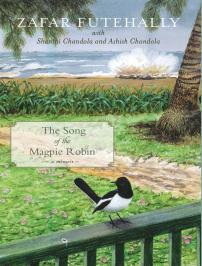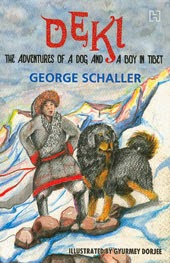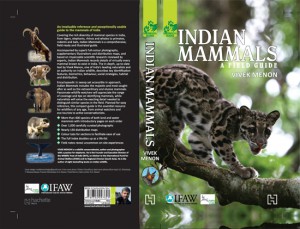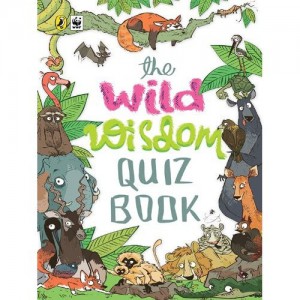Zafar Futehally ” The Song of the Magpie Robin – a memoir”
 Zafar Futehally was a well-known birder, naturalist and writer. He was one of the pioneers of the conservation movement in India and was instrumental in making it an important middle class concern. For instance getting an advertisement for WWF in a popular magazine of those days.
Zafar Futehally was a well-known birder, naturalist and writer. He was one of the pioneers of the conservation movement in India and was instrumental in making it an important middle class concern. For instance getting an advertisement for WWF in a popular magazine of those days.
We had no scruples in ‘using’ any of our friends to advance our work; Khushwant Singh was the editor of The Illustrated Weekly of India in those days, and he promised Shama a full-page advertisement for the WWF in the Weekly if she wrote a completely original article on sparrows. Shama wrote it, and we got our first big advertisement for the Indian appeal. It was designed by Alyque Padamsee, and showed a tiger with the caption ‘Born Free, Sentenced to Death’. ( p.138)
Zafar Futehally’s fascination for bird watching began when accompanied Salim Ali on his expeditions. There are some fabulous memories he recalls of those expeditions. This book was written in collaboration with Shanthi Chandola and Ashish Chandola. They persuaded Zafar Futehally to email them short articles/notes recalling his life, especially related to conservation. All though charmingly written and a little uneven, it is a valuable addition to the history of conservation in India. As George B. Schaller says in his foreword:
Wildlife was little studied or appreciated in India during the 1960s, other than along the sight of a gun. But Zafar already had a vision, as he expressed in 1969 in a keynote speech at the General Assembly of the International Union for Conservation of Nature ( IUCN) held in Delhi, an event I also attended. ‘What I came to do is to reflect the concern of the ordinary citizen about our deteriorating environment.’ And he turned this thought superbly into action. With tenacity and tact, he built bridges between organizations, nurturing their conservation efforts, whether it was promoting green areas in Bangalore ( now Bengaluru), establishing the Karnala Bird Sanctuary or other initiatives that revealed his deep concern and respect for the natural world. He knew that unrestricted development would deprive India of a healthy environment and a secure future, a message he delivered persistently and with the quiet authority of someone who was a high-ranking member of every major conservation organization in the country and a Founder of World Wildlife Fund ( WWF)-India. He, more than anyone in India, helped forge awareness that the environment, with all its species of animals and plants, must be protected. That is his lasting legacy. ( p.xiii)
Zafar Futehally’s wife, Laeeq Futehally, was a notable writer about nature herself. She wrote many books, including co-authoring some with Salim Ali. But A Sahib’s Manual for the Mali of articles edited by her is an all-time favourite of mine. ( http://permanent-black.blogspot.in/2008/08/cricket-music-gardening-new-paperbacks.html )
Zafar Futehally The Song of the Magpie Robin: A Memoir Rainlight, Rupa, New Delhi, 2014. Hb. p.200 Rs. 500
Some of the other books and essays related to Nature that I came across in 2014 were:
1. George Schaller Deki, the Adventures of a Dog and a Boy in Tibet A lovely, moving and brilliant story about a boy and his dog also an  introduction to the environment. It is scrumptiously illustrated by an artist from the Tibetan art collective, Gyurmey Dorjee. According to the publisher, Permanent Black, on their blog,
introduction to the environment. It is scrumptiously illustrated by an artist from the Tibetan art collective, Gyurmey Dorjee. According to the publisher, Permanent Black, on their blog,
DEKI is a magical book that will have you instantly under its spell. It is a blend of great story-telling and acute observation of nature and animals. As you read it you travel the stark, barren plateau of Tibet and discover its animals, monasteries, birds, nomads. Thrilling chases and cliff-hanger moments decide the battle between good and evil as the book explores the question: freedom or security, which do you choose? ( http://permanent-black.blogspot.in/2014/05/the-story-of-book.html )
I agree. I read it slowly. Savoured it.
It has been jointly published by Black Kite and Hachette India.
 2. Vivek Menon Indian Mammals: A Field Guide It is described a reference and exceptionally usable guide to the mammals of India. It is four-colour with more than 400 species of both land and water mammals.
2. Vivek Menon Indian Mammals: A Field Guide It is described a reference and exceptionally usable guide to the mammals of India. It is four-colour with more than 400 species of both land and water mammals.
3. George Monbiot’s essay “Back to Nature”. The first article in BBC Earth’s ‘A World of View’ series of essays by leading environmental authors. ( http://www.bbc.com/earth/bespoke/story/20141203-back-to-nature/index.html )
4. The Wild Wisdom Quiz Book published by Puffin India and WWF India. It consists of questions, trivia and illustrations compiled from India’s only national level quiz on wildlife.
29 Dec 2014


